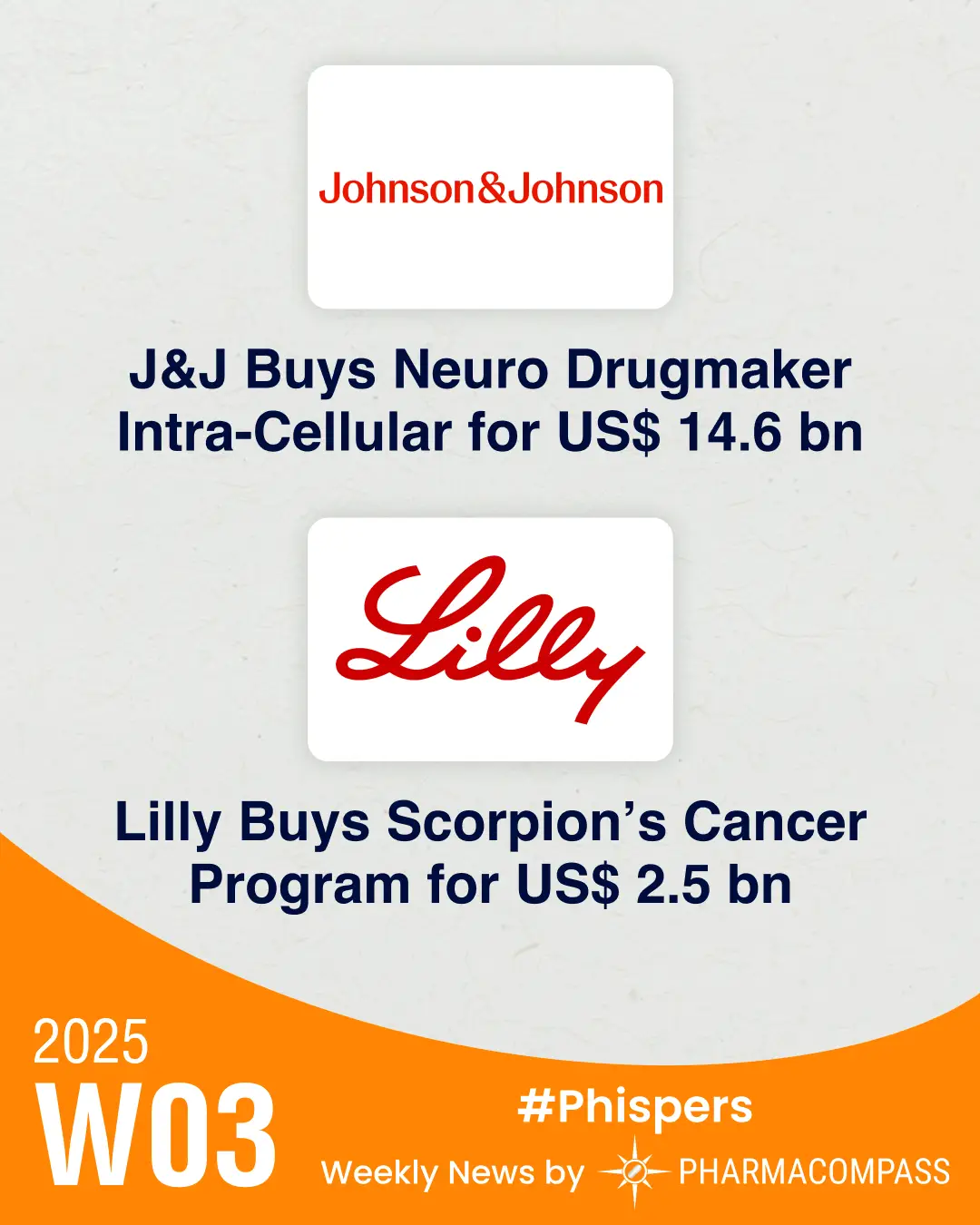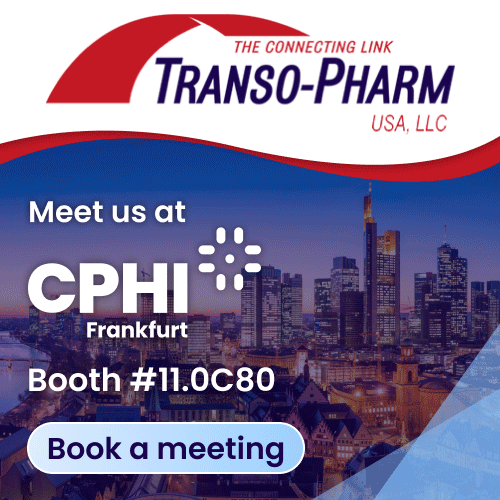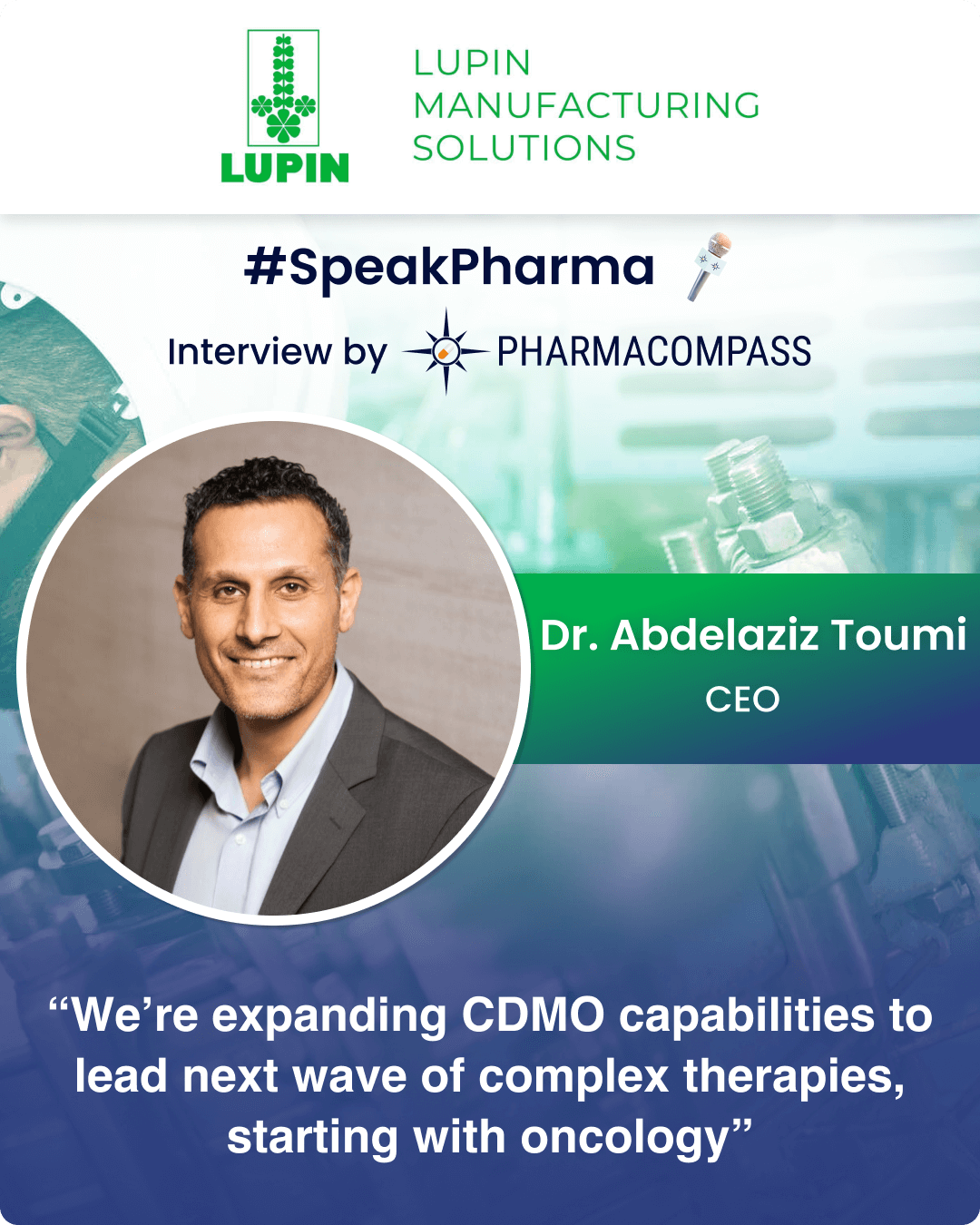
By PharmaCompass
2025-01-16
Impressions: 930 (Article) || 41 (Video)
The week saw the J.P. Morgan Healthcare Conference kick off with a flurry of deals. In all, deals worth over US$ 19.3 billion were signed at the annual event.
Johnson & Johnson made waves with its US$ 14.6 billion acquisition of Intra-Cellular Therapies, betting big on brain disease treatments. Eli Lilly strengthened its cancer portfolio by scooping up Scorpion Therapeutics’ cancer program for US$ 2.5 billion, while GSK bolstered its gastrointestinal stromal tumor pipeline with its US$ 1.15 billion purchase of Boston-based biotech IDRx.
The Federal Trade Commission (FTC) exposed how America’s largest pharmacy benefit managers (PBMs) pocketed US$ 7.3 billion through drug price markups.
In a strategic partnership, Gilead and LEO Pharma joined forces in a US$ 1.7 billion deal targeting inflammatory diseases. AbbVie looked east, securing rights to Chinese drugmaker Simcere’s promising blood cancer drug.
In news from clinical trials, Regeneron’s Libtayo posted impressive results in treating skin cancer in a late stage trial, succeeding where Merck’s Keytruda had previously fallen short.
J&J doubles down on neuroscience with US$ 14.6 bn acquisition of Intra-Cellular
Johnson & Johnson has announced acquisition of Intra-Cellular Therapies for US$ 14.6 billion, marking its biggest deal in over two years and boosting its presence in the market for brain disease treatments. Intra-Cellular’s Caplyta (lumateperone) is a once-daily oral therapy approved for treating adults with schizophrenia and depressive episodes associated with bipolar I or II disorder. Intra-Cellular is also seeking expanded regulatory approval in the US for Caplyta as an add-on therapy for major depressive disorder (MDD). Caplyta is expected to generate over US$ 5 billion in peak year sales.
Among other candidates, the deal includes ITI-1284 — a promising phase 2 compound being studied for generalized anxiety disorder and Alzheimer’s disease-related psychosis and agitation. This acquisition aligns with J&J’s notable presence in the neuroscience market which brought in sales worth US$ 7.14 billion in 2023.
Three major PBMs gained US$ 7.3 bn by inflating drug prices, finds FTC
The US Federal Trade Commission (FTC) has found that the nation’s three largest pharmacy benefit managers (PBMs) significantly inflated drug prices, netting an extra US$ 7.3 billion from 2017 to 2022. The companies involved are UnitedHealth Group’s Optum, CVS Health’s CVS Caremark, and Cigna’s Express Scripts. They marked up prices at their pharmacies by hundreds or thousands of percent, particularly for heart disease, cancer, and HIV medications. The FTC has sued the three PBMs, accusing them of steering diabetes patients towards higher-priced insulin products to reap millions of dollars in rebates from drugmakers.
Lilly to buy Scorpion’s cancer program for up to US$ 2.5 bn; partners Alchemab for ALS meds
Eli Lilly has announced the acquisition of Scorpion Therapeutics’ experimental cancer therapy, STX-478 (a PI3Kα inhibitor program), for up to US$ 2.5 billion in cash. STX-478, a once-daily oral therapy, is currently in phase 1/2 clinical trials for breast cancer and other advanced solid tumors. As part of the deal, Scorpion will spin out its non-PI3Kα pipeline assets and employees into a new entity. This new company will be owned by Scorpion’s current shareholders, with Lilly holding a minority equity interest. The existing entity (with the PI3Ka program) will be acquired by Lilly.
Partners UK’s Alchemab for ALS drug development: Lilly has partnered UK-based Alchemab Therapeutics to develop up to five new antibodies targeting amyotrophic lateral sclerosis (ALS). This collaboration comes at a challenging time for ALS drug development, as several rival candidates have recently failed in clinical trials.
GSK buys Boston-based biotech IDRx for US$ 1.15 bn, gains its gastro tumor asset
GSK has agreed to acquire IDRx, a Boston-based clinical-stage biopharmaceutical company, for up to US$ 1.15 billion. This acquisition includes IDRx’s lead molecule, IDRX-42, a highly selective KIT tyrosine kinase inhibitor (TKI) designed to treat gastrointestinal stromal tumors (GIST). IDRX-42 is currently being investigated in an early-to-mid-stage trial for patients with advanced GIST. The British drugmaker will pay US$ 1 billion upfront, with an additional US$ 150 million contingent on achieving regulatory approval milestones.
Boehringer, Synaffix sign ADC deal: Boehringer Ingelheim has expanded its oncology pipeline with two licensing deals. One, the company has partnered Synaffix in a deal worth up to US$ 1.3 billion to advance antibody-drug conjugates (ADCs). Two, it exercised the option to gain rights to a fourth novel cancer target from an ongoing discovery collaboration with Oxford BioTherapeutics signed in 2014.
Novartis in deal with Light House Therapeutics: A San Diego-based startup Light Horse Therapeutics has received US$ 62 million in series A funding. And on the same day, it inked a potential US$ 1 billion deal with Novartis. The deal with Novartis involves an upfront payment of US$ 25 million. Novartis will identify and develop potentially first-in-class cancer therapeutics using Light Horse’s precision genetic editing-based platform.Gilead, LEO Pharma ink US$ 1.7 bn deal to develop meds for inflammatory diseases
Gilead Sciences and LEO Pharma have teamed up in a deal worth up to US$ 1.7 billion to develop oral STAT6 (signal transducer and activator of transcription 6) inhibitors for inflammatory diseases. Gilead will handle the development and commercialization of the oral treatments, while LEO Pharma will focus on topical formulations. The STAT6 inhibitors will target key pathways in conditions like atopic dermatitis, asthma, and COPD (chronic obstructive pulmonary disease), offering a potential oral alternative to injectable biologics. Gilead will pay LEO US$ 250 million upfront.
AbbVie to license Simcere’s blood cancer med: AbbVie has acquired an option to license Simcere Zaiming’s SIM0500, a novel trispecific antibody candidate for multiple myeloma in a deal valued at up to US$ 1.06 billion. AbbVie will hold the rights to develop and commercialize SIM0500 outside of Greater China, while Simcere retains rights within Greater China.
Regeneron’s Libtayo posts late-stage win: Regeneron has announced that its PD-1 inhibitor, Libtayo (cemiplimab) significantly improved disease-free survival (DFS) in a phase 3 trial for patients with high-risk cutaneous squamous cell carcinoma (CSCC) after surgery. Libtayo is the first and only immunotherapy to demonstrate a statistically significant and clinically meaningful benefit in high-risk CSCC in the adjuvant setting. This success comes after Merck’s Keytruda failed in the same indication in August 2024.
Temporary pause on Novartis’ Entresto generic: An appeals court in the US has temporarily paused the launch of MSN Pharmaceuticals’ generic version of Novartis’ blockbuster heart-failure drug Entresto. The court is considering Novartis’ emergency request for a longer pause.
The PharmaCompass Newsletter – Sign Up, Stay Ahead
Feedback, help us to improve. Click here
Image Credit : Phisper Infographic by PharmaCompass license under CC BY 2.0
“ The article is based on the information available in public and which the author believes to be true. The author is not disseminating any information, which the author believes or knows, is confidential or in conflict with the privacy of any person. The views expressed or information supplied through this article is mere opinion and observation of the author. The author does not intend to defame, insult or, cause loss or damage to anyone, in any manner, through this article.”








